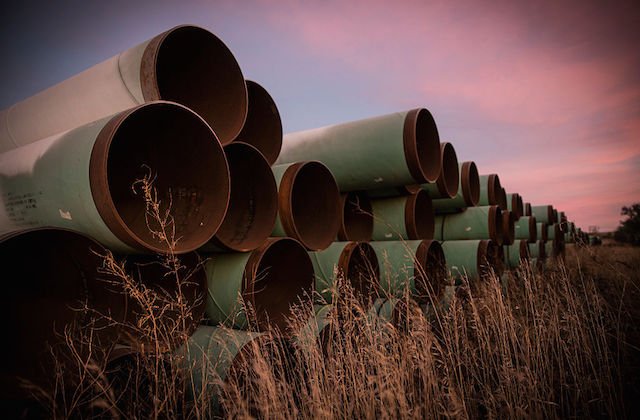The Keystone XL Pipeline Is a Go. Now What?

Yesterday (November 21), the Nebraska Public Service Commission ruled in favor of a permit that would allow for construction of the Keystone XL pipeline.
This was the final step in building the 1,100-mile pipeline, which President Donald Trump gave the greenlight via an executive order shortly after he took office. Keystone XL is owned by TransCanada, the same company whose Keystone pipeline spilled 210,000 gallons of oil in a field in South Dakota last Thursday (November 16). It would run from Alberta, Canada, through Nebraska.
Activists have been fighting the pipeline for years, and yesterday's ruling brought strong reactions—both positive and negative—from a range of politicians, environmentalists and Indigenous groups.
Protectors prepare for a press conference outside the KXL hearing in Lincoln pic.twitter.com/H0jz0GE4i9
— KevinAbourezk (@Kevin_Abourezk) November 20, 2017
Wiconi Un Tipi Camp rises to fight back against another controversial pipeline @Kevin_Abourezk https://t.co/xPBavhX7HP pic.twitter.com/iRfBGYQqOT
— indianz.com (@indianz) November 20, 2017
Under a 2011 state law, the five-person, independent commission was prohibited from factoring safety concerns into its decision.
Nebraska officials have said state law didn't allow regulators to consider pipeline safety as a factor in their decision. https://t.co/46c2YbPb4k
— KELOLAND News (@keloland) November 20, 2017
It’s been just 4 days since the Keystone Pipeline spilled 210,000 gallons of oil in South Dakota. Despite this atrocity, Nebraska has approved #KeystoneXL. I will keep fighting to protect our land from this disastrous proposal.https://t.co/na0scYYa7v
— Rep. Barbara Lee (@RepBarbaraLee) November 20, 2017
The 3-2 ruling in favor of the permit was not a full victory for TransCanada. Per The New York Times:
The regulators in Nebraska rejected the pipeline company’s preferred route, approving the project only on an alternate path. TransCanada, the pipeline company, later issued a short statement that did not say whether it would move forward with construction, leaving people on both sides of the issue unsure of how to react.
“They do not get their preferred route, the route that we have been fighting in courts over for eight years,” Jane Kleeb, the longtime leader of Nebraska’s anti-pipeline efforts, said of TransCanada. “What is wrong—and what we will continue to fight—is that this pipeline is still on the table.”
Activists, tribal nations, local ranchers declare a partial victory after the Nebraska Public Service Commission rejected TransCanada’s preferred route for the proposed #KeystoneXL pipeline. https://t.co/JzJ9dxL3m2 #NoKXL
— Sierra Club (@SierraClub) November 21, 2017
Tribal council member Casey Camp-Horinek of the Ponca Tribe of Oklahoma, told Native News Online: “The Ponca Tribe of Oklahoma has been on the receiving end of the ‘pipelines are safe’ myth for generations and has suffered greatly from the environmental genocide enacted by the extractive industry. Now our point has been proven again by last week’s Keystone 1 mega-spill. The fight is now on. Keystone XL will never be allowed to cross Ponca territory. We stand in solidarity with our Northern Ponca relatives in this unified defense of Mother Earth."
A larger contingent of Native leaders from the Treaty Alliance—which includes 150 of the Indigenous tribes along the Keystone XL route in both the United States and Canada—issued a statement after the ruling, saying, "Today’s decision by the Nebraska Public Service Commission to approve the route of TransCanada’s Keystone XL tar sands pipeline does not change a thing: people power will still stop this pipeline."
Tribal Leaders from USA and First Nation Chiefs from Canada: “Ruling in Nebraska will not… https://t.co/9tgqni7Kgb pic.twitter.com/Yw2wHO4N2a
— NativeNewsOnline (@Native_NewsNet) November 21, 2017
Since the ruling, activists have called for people to put pressure on investors, including financial institutions Chase and Wells Fargo, to divest.
BREAKING: The Keystone XL pipeline just got a key permit in Nebraska. Now, we need your help. RT to show @Chase and other funders that you will resist tar sands pipelines every step of the way. pic.twitter.com/sAHfkW5BpJ
— Greenpeace USA (@greenpeaceusa) November 20, 2017
